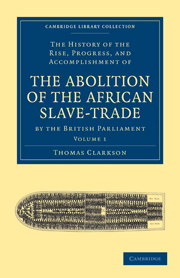Book contents
Summary
I scarcely know of any subject, the contemplation of which is more pleasing than that of the correction or of the removal of any of the acknowledged evils of life; for while we rejoice to think that the sufferings of our fellow-creatures have been thus, in any instance, relieved, we must rejoice equally to think that our own moral condition must have been necessarily improved by the change.
That evils, both physical and moral, have existed long upon earth there can be no doubt. One of the sacred writers, to whom we more immediately appeal for the early history of mankind, informs us that the state of our first parents was a state of innocence and happiness; but that, soon after their creation, sin and misery entered into the world. The Poets in their fables, most of which, however extravagant they may seem, had their origin in truth, speak the same language. Some of these represent the first condition of man by the figure of the golden, and his subsequent degeneracy and subjection to suffering by that of the silver, and afterwards of the iron, age. Others tell us that the first female was made of clay; that she was called Pandora, because every necessary gift, qualification, or endowment, was given to her by the Gods, but that she received from Jupiter at the same time, a box, from which, when opened, a multitude of disorders sprung, and that these spread themselves immediately afterwards among all of the human race.
- Type
- Chapter
- Information
- Publisher: Cambridge University PressPrint publication year: 2010First published in: 1808

